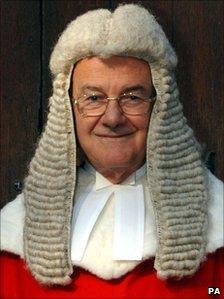Juries banned from using internet to research cases
- Published

Lord Justice Judge warned internet research could affect convictions
Jurors in criminal trials should be banned from using the internet to research their cases, the Lord Chief Justice of England and Wales has said.
Issuing new guidance at the Court of Appeal, Lord Justice Judge said a "polite request" to jurors not to browse the web was not enough.
He said using the material to help make decisions could result in a conviction being quashed.
He said guidance about web use "must" be given at the outset of a trial.
Lord Judge made his comments in a judgement relating to six appeals in which there had been allegations of jury irregularities.
He said that web use was so common that specific guidance had to be given and that jurors had to understand that "although the internet is part of their daily lives, the case must not be researched there".
'Basic principle'
They must also avoid discussing the case on social networking sites.
He said any web research should not be brought into the decision-making process as it would be unfair to those being tried.
"Research of this kind may affect their decision, whether consciously or unconsciously, yet at the same time neither side at trial will know what consideration might be entering into their deliberations and will therefore not be able to address arguments about it.
"This would represent a departure from the basic principle which requires that the defendant be tried on the evidence admitted and heard by them in court," he said.
Sitting with Lord Justice Hughes and Mr Justice Bean, he added: "We recommend a direction in which the principle is explained not in terms which imply that the judge is making a polite request, but that he is giving an order necessary for the fair conduct of the trial," he said.
However, Lord Judge stressed that most trials continued without the inclusion of "extraneous material" and said: "Allegations of this kind rarely trouble the Court of Appeal."
He explained such material included "telephone calls into or out of the jury room, papers mistakenly included in the jury bundle, discussions between jurors and relatives or friends about the case, and in recent years information derived by one or more jurors from the internet".
He said it was the "collective responsibility" of the jury to ensure that their decision-making was fair.
Irregularity
The BBC's home affairs correspondent Danny Shaw said that in one of the appeals, brought by a man convicted of stabbing his girlfriend in the chest, it emerged that a juror had done "homework" on the internet about the case and legal terminology.
However, the Court of Appeal said the conviction was "safe" because it had not affected the jury's deliberations.
The only conviction to be quashed by the court was that of a man who had been found in possession of a pocket knife at a school he had been working at.
One jury member had arrived at court carrying an "implement like a pair of clippers", which was seized by security.
The man had wanted to demonstrate a point about the case to other jurors and had brought clippers in because he wasn't allowed to bring a knife.
The Court of Appeal quashed the conviction because the trial judge had "ignored" the possibility that juror's experiments with the clippers may have influenced the jury's deliberations.